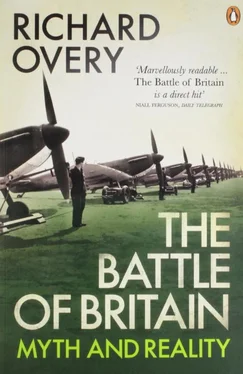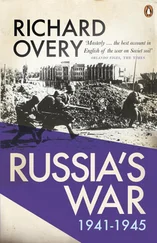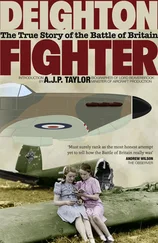The onset of the bombing war in September 1940, the ‘Blitz’ as it soon became known, revived anxieties about a sudden overwhelming strike from the sky to force surrender on a stunned people. When Harold Nicolson visited the Master of Corpus Christi College in Cambridge in January 1941, he was warned that the public had no idea ‘how gigantic the German knock-out blow will be when it comes’. 5Gas warfare was a persistent fear. In November the Labour Leader Clement Attlee was given responsibility to get Britain’s stock of poison gas up to the level of 2,000 tons agreed before the war, in case the Germans used gas as a final resort. Churchill became more anxious as time passed that desperation might push the enemy to resort to chemical weapons. In February 1941 a cypher message arrived from Budapest, courtesy of the American legation, warning not only that the invasion of Britain was scheduled for March, but also that German scientists had perfected ‘a new soporific gas’ whose effects would last for thirty-six hours whilst German forces stormed ashore. To Churchill’s immediate inquiry about Britain’s gas capability, the Air Staff replied that the RAF could attack the German population with gas bombs for only four or five days, but if gas was mixed in with high-explosive bombs the campaign might last for two or three weeks. 6
That same month came further intelligence from Switzerland that Germany had retained a secret force of 10,000 aircraft to hit Britain with one massive aerial blow at a critical moment. Churchill now asked the Air Staff to tell him what kind of aerial ‘banquet’ the RAF could lay on in retaliation. Though the RAF was rightly sceptical about any secret air force, they relayed to Churchill the cheerless statistical conclusion that Germany could probably send across some 14,000 aircraft, while the RAF could scrape together only 6,514, including 2,000 trainers and 3,000 reserves. 7
The edginess evident among British political circles reflected the widespread belief that invasion had only been postponed in September 1940 by the exertions of Fighter Command, not cancelled. In the spring of 1941 the Ministry of Information renewed the circulation of pamphlets about invasion in an effort to challenge popular complacency; Fighter Command was issued with new operational instructions early in March for the fight over the invasion beaches. Information from Europe was ambiguous, partly because Hitler had ordered a campaign of deception to mask the operational preparations to attack the Soviet Union by apparently maintaining the pressure on Britain; and partly because Hitler did not entirely exclude the possibility of invasion if Britain became sufficiently weakened or demoralized. In discussion with the German Navy commander in January, he suggested that the aerial and naval blockade of British imports might lead to victory as early as July or August 1941, or create the conditions necessary to permit successful invasion and occupation, or, finally, produce the coveted ‘negotiated’ peace. 8
It is evident that Hitler’s view of the British problem did not alter a great deal between the summer of 1940 and the spring of 1941. The air battles of August and September 1940 were regarded from the German side as just one part of a campaign that lasted almost a year to find ways of bringing sufficient pressure on Britain to get her to give up. The campaign included a political offensive to persuade Spain and Italy to collaborate in destroying Britain’s precarious military position in the Mediterranean and North Africa (an effort that stumbled on Franco’s refusal to join the war, and Mussolini’s decision, kept secret from Hitler, to move into the Balkans instead by invading Greece in October 1940). The naval war, which grew into what became known as the Battle of the Atlantic, developed as a blockade strategy largely independent of the invasion operation, and one that pushed the British war effort to its limit long after the Battle of Britain. Invasion itself was always just one option, and one for which Hitler himself had deep reservations.
It is open to debate whether the air battle of the autumn of 1940 was the decisive factor affecting the German decision whether or not to invade. There were other reasons for delaying. It is often forgotten that there stood more than an air force between Hitler and conquest of Britain. The German Navy was heavily outnumbered by the Royal Navy, even one stretched taut by the demands of other theatres. The German Navy as a result always remained half-hearted about the whole operation, and made its views felt throughout the weeks of preparation. The British army may not have been a match for the German army in the field, but it represented a considerable threat to a landing attempt. The German army leadership undertook what preparations they could, but they were faced with an operation for which there was simply no precedent in German military history, and one for which preparation was at best improvised. General Günther von Blumentritt, an army staff officer assigned to Operation Sealion, later described the preparations carried out in 1940 as woefully inadequate: ‘It must not be forgotten that we Germans are a continental people,’ he wrote. ‘We knew far too little of England. We knew literally nothing of amphibious operations. At the time we were preparing Sealion plans, accounts of the campaigns of Caesar, Britanicus and William the Conqueror were being read…’ 9Above all, the German leadership recognized, as the western Allies were to realize in the invasion of Normandy, four years later, that defeat would be a political and military catastrophe. ‘It is imperative,’ wrote General Alfred Jodl, Hitler’s Chief of Operations, in August 1940, ‘that no matter what might happen the operation dare not fail.’ 10
There need be no doubt that under the right circumstances Hitler was serious about invading Britain in 1940. There remained, none the less, a genuine ambivalence in his attitude to the British problem. He understood how difficult the practical questions were and was keen to avoid ‘risky experiments’ and ‘high losses’. He confessed to an audience of Party bosses that he was ‘shy of the water’, which may explain why he listened so closely to what Raeder and the navy had to say in 1940. 11He wanted invasion to be foolproof, ‘absolutely assured’. He kept the door open to a political settlement: ‘Even today the Fuehrer is still ready to negotiate peace with Britain,’ ran the minutes of a Führer conference in January 1941. 12Hitler’s view of Britain is well known: a curious blend of envy and admiration, of contempt for her current state of decadence and respect for a famous history. In his memoirs Adolf Galland recalled a conversation with Hitler when he came to Berlin from the air battle in September 1940 to collect Germany’s highest military award, the oak leaves to the Knight’s Cross. Alone with Hitler, Galland told him the unalloyed truth about how tough air combat against Britain had proved to be. Instead of the diatribe of contradiction he had expected, Hitler explained his respect for the Anglo-Saxon peoples, his regret at the life-and-death struggle between the two states – the ‘world-historical tragedy’ that now promised only total destruction where there might have been fruitful collaboration. 13
It is evident that not a lot was needed to deter Hitler from the idea of invading Britain. Fighter Command tipped the scales. The failure to destroy the Royal Air Force ruled out the possibility of a cheap, quick end to the war in the west and kept alive an armed anti-Axis presence in Europe. The full significance of this outcome was not realized on the British side as the air battle shifted to its new and more deadly phase from September 1940. But when Dowding forwarded to the Air Ministry in mid-November a report on the previous two months of air fighting compiled by Air Vice-Marshal Park, he began at last to develop some sense of what his force had now achieved:
Читать дальше












